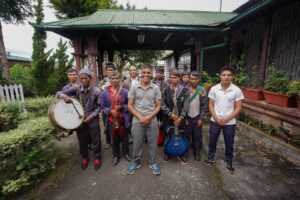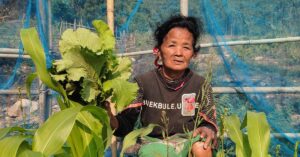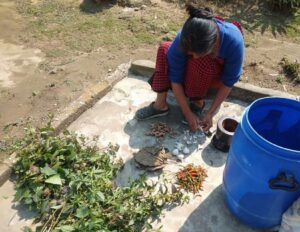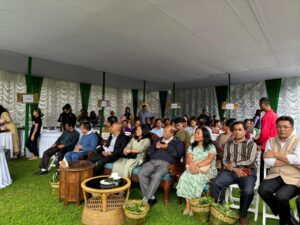 In concurrent with the celebrations of the International Day of the World’s Indigenous Peoples, NESFAS launched the Mei Ramew State Agroecology Co-operative Society on the 9th of August 2024.
In concurrent with the celebrations of the International Day of the World’s Indigenous Peoples, NESFAS launched the Mei Ramew State Agroecology Co-operative Society on the 9th of August 2024.
The newly launched Cooperative Society is made up of 19 (nineteen) Primary Cooperatives representing 19 villages. The Society is set to prepare the Primary Cooperatives members in terms of capacity building, business plans, bookkeeping, networking amongst other activities. Several capacity building programmes have also been initiated in collaboration with SIRD & BRDC. The launch was also accompanied by a Mei-Ramew farmers’ market where local produce and cuisine from across communities that NESFAS works with were sold.
The society was officially launched by the Chief Guest, Mr. R. Rymbai, Deputy Registrar, Cooperative Society, Government of Meghalaya, at NESFAS’ headquarters in Shillong in the presence of indigenous community members, press faculty, bureaucrats, and executive board members of NESFAS.
Mr. Shaiphar Dohling, Chairperson, Mei Ramew State Agroecology Co-operative Society, in his welcome address, stated that the Society is designed to promote livelihoods and build relationships among partner communities and in the long run, work for the betterment of mother nature.
NESFAS’ Chairperson Mr. Nestar Kharmawphlang also spoke briefly about the objectives of the co-operative society. He shared that the Cooperative Society is aimed at supporting the local economy by providing vocational training, encouraging innovation and inspiring people to adopt environment-friendly methods of farming and other activities.
“The Mei Ramew State Agroecology Co-operative Society aims to bring sustainable change by supporting and empowering indigenous peoples. Mei Ramew literally translates to Mother Earth and this is a testament of NESFAS’ commitment towards respecting and protecting our planet.” Mr. Nestar added.
In his keynote address, Mr. Pius Ranee, Executive Director, NESFAS, cited a global study undertaken by NESFAS encompassing Indigenous Communities from India (Meghalaya), Kenya, Mexico and Thailand which demonstrate that local food systems can contribute substantially to solving some of the pressing global issues, including climate change and biodiversity loss.
“The results are highly promising and suggest that indigenous values of caring and sharing embedded in its governance structure can help the world overcome the ecological and social challenges besetting it.” Mr. Pius shared, adding that the study was conducted using the TAPE methodology as designed by FAO-UN.
He then shared briefly on why and how the cooperative society came about and expressed his happiness in launching the initiative in the presence of the NESFAS executive board, staff and other key stakeholders on International Day of the World’s Indigenous Peoples.
“We (NESFAS) will work hard to hopefully scale this model to other States and communities,” concluded Mr. Pius.
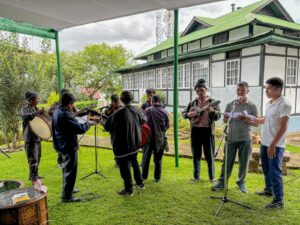 The guests were thereafter enthralled with a dance and song performance from the community groups before the official launch of the Cooperative society by the Chief Guest of the day, Mr. R. Rymbai, Deputy Registrar, Cooperative Society, Government of Meghalaya.
The guests were thereafter enthralled with a dance and song performance from the community groups before the official launch of the Cooperative society by the Chief Guest of the day, Mr. R. Rymbai, Deputy Registrar, Cooperative Society, Government of Meghalaya.
Mr. R. Rymbai stated that the newly launched Cooperative society is unique in the fact that it deals with agroecology and extended his best wishes for the progress and prosperity of the same. He commented that it has been a great start for the Society and shared his hope that it will continue to grow with the participation of each community member in the years to come.
The closing remarks were delivered by Mr. Rajesh B. Marak, Vice Chairperson, Mei Ramew State Agroecology Co-operative Society who stated that supporting custodian farmers and embracing natural farming methods is a way of preserving our health as well as ensuring the sustainability of the Indigenous food systems.
He ended on a positive note, beseeching everyone to carry forward the spirit of cooperation, resilience, and sustainability and sharing his dream of building a future where indigenous traditions thrive and communities prosper.
The formal inauguration of the new Society was followed by a farmers’ market where the primary cooperatives of the society showcased their produce and local food. Mrs. S Klein, a member of the Mei Ramew Cooperative Society from Plasha shared that the inception of this body has immensely benefited farmers following the traditional farming practices.
Another member of the Mei Ramew Cooperative Society, Mrs. Bisikrin Marwein from Mawlum Mawjahksew was of the opinion that the society will help indigenous communities improve their well being and livelihood and added that the younger generations will try their best to learn from the older generations of traditional knowledge holders through the society.
The Farmers’ Market is a regular forward linkage activity promoted by NESFAS for farmers from across the State, and is part of the ongoing project “Demonstrate successful community-based initiatives and innovate to create healthy and sustainable food systems to conserve/manage biodiversity, build climate resilience, improve nutrition and local livelihoods” supported by IPAF- Tebtebba of UN-IFAD.


